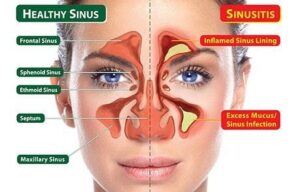Last updated on September 26th, 2024 at 11:15 am
Sinusitis treatment involves a range of approaches to alleviate the symptoms and address the underlying causes of sinus inflammation and infection. This may include home remedies like steam inhalation and saline nasal rinses, over-the-counter medications such as decongestants and pain relievers, prescription drugs like antibiotics or corticosteroids for severe cases, and, in some instances, surgical procedures to improve sinus drainage or correct structural issues.
The specific sinusitis treatment plan is determined based on the severity and duration of the condition. Sinusitis, also known as a sinus infection, occurs when the lining of the sinuses becomes inflamed.
These small, air-filled cavities are located in the bones of the face and skull, and they are essential for draining mucus and facilitating airflow. When they become blocked due to inflammation, mucus accumulates, leading to infection and the unpleasant symptoms that come with it.
Symptoms of Sinusitis
Sinusitis can manifest in various ways, and its symptoms may range from mild to severe. Common symptoms of sinusitis include:
- Facial pain or pressure
- Nasal congestion
- Discolored nasal discharge
- Cough
- Headache
- Fatigue

Sinusitis Treatment
Let’s explore the various sinus infection treatment options available to alleviate these distressing symptoms.
1. Home Remedies for Sinusitis Treatment
For mild cases of sinusitis, home remedies can often provide relief. These include:
- Steam inhalation: Inhaling steam can help soothe your sinuses and relieve congestion. You can achieve this by inclining over a vessel of warm water while ensconced under a cloth.
- Nasal irrigation: Using a saline solution to flush out your nasal passages can help remove mucus and reduce congestion. Neti pots and saline nasal sprays are frequently used for this specific intent.
- Hydration: Staying well-hydrated by drinking plenty of fluids can help keep mucus thin and easier to expel.
- Rest: Getting adequate rest allows your body to heal more effectively and can help speed up your recovery.
Home remedies are often the first line of defence against sinusitis, especially when the symptoms are mild. However, if your symptoms persist or worsen, it’s essential to consult a healthcare professional for further evaluation and treatment.
Read: What are Generic Medicines?
2. Over-the-Counter Medications
Over-the-counter (OTC) medications can be effective in managing sinusitis symptoms. These include:
- Decongestants: Oral decongestants like pseudoephedrine can help reduce nasal congestion by narrowing blood vessels in the nasal passages.
- Antihistamines: These can be helpful if allergies are contributing to your sinusitis symptoms, as they can reduce allergic reactions and alleviate congestion.
- Pain relievers: Non-prescription pain relievers like ibuprofen or acetaminophen can help reduce headache and facial pain associated with sinusitis.
It’s important to follow the recommended dosages and consult a healthcare professional if you have any underlying medical conditions or are taking other medications to avoid potential interactions.
3. Prescription Medications for Sinus Infection treatment
In cases of severe or chronic sinusitis, a healthcare provider may prescribe specific medications to address the underlying infection and inflammation. These may include:
- Antibiotics: If the sinusitis is caused by a bacterial infection, a course of antibiotics may be necessary to clear the infection.
- Corticosteroids: These anti-inflammatory medications can be prescribed as nasal sprays or oral tablets to reduce inflammation in the nasal passages and sinuses.
- Nasal corticosteroid sprays: These are often used to manage chronic sinusitis and can help reduce inflammation and control symptoms.
- Immunotherapy: In cases where allergies contribute to chronic sinusitis, immunotherapy may be recommended to desensitize the immune system to specific allergens.

4. Surgical Interventions
When other treatments fail to provide relief, or if structural issues within the sinuses are causing recurrent infections, surgery may be necessary. Some common surgical options for sinus infection treatment include:
- Endoscopic sinus surgery: This minimally invasive procedure involves the insertion of a thin, flexible tube with a camera (endoscope) into the nasal passages to remove blockages and improve drainage.
- Balloon sinuplasty: This procedure uses a small, balloon-like device to open blocked sinus passages and is less invasive than traditional sinus surgery.
- Sinus surgery: In more severe cases, traditional sinus surgery may be required to remove obstructions, correct structural issues, or open up the sinus cavities.
It’s important to note that surgery is usually considered a last resort when other sinus infection treatments have been ineffective, and it should only be performed by an experienced ENT (ear, nose, and throat) surgeon.
> Consult a doctor and Order Medicine Online
Conclusion:
Sinus infection treatment options vary depending on the severity and underlying cause of your sinus infection. While many cases can be managed effectively with home remedies and over-the-counter medications, it’s crucial to consult a healthcare professional if your symptoms persist, worsen, or if you have a history of chronic sinusitis.
By seeking appropriate sinusitis treatment, you can find relief from the discomfort of sinusitis and improve your quality of life.
Are generic drugs as safe as brand name drugs?
Yes, generic drugs are generally as safe and effective as their brand-name counterparts. They contain the same active ingredients, are regulated by the same strict standards from health authorities, and must meet rigorous quality and safety criteria.
The main difference is the price, as generic drugs are typically more affordable due to lower research and development costs. Patients can often save money without compromising on safety or effectiveness by opting for generic versions of their medications when available.
FAQs on Sinusitis Treatment
Q1: What is sinusitis treatment?
Sinusitis treatment involves relieving symptoms and addressing the underlying cause, which may include home remedies, over-the-counter or prescription medications, and, in severe cases, surgical interventions to improve sinus drainage and reduce inflammation.
Q2: What are the main over-the-counter medications for sinusitis treatment?
Over-the-counter options include decongestants to relieve congestion, antihistamines for allergy-related symptoms, and pain relievers like ibuprofen or acetaminophen.
Q3: When should I consider seeing a doctor for sinusitis treatment?
Consult a doctor if your symptoms persist beyond 10 days, worsen, or if you have a history of chronic sinusitis, as you may need prescription medications or further evaluation.
Q4: Are there surgical options for sinusitis treatment?
Yes, surgical interventions like endoscopic sinus surgery or balloon sinuplasty may be considered in cases of recurrent or severe sinusitis when other treatments have failed.
Related Links: